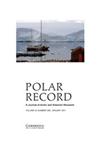Knowledge, innovation and the race to the South Pole
IF 1.6
4区 环境科学与生态学
Q3 ECOLOGY
引用次数: 0
Abstract
Abstract The present article extends recent studies that ask what might else have been considered by Scott and Amundsen in planning their sledging operations to reach the South Pole during the southern summer of 1911/12. Both were on the cusp of changes in exploration methods and had at hand significant knowledge from past expeditions. Scott’s preparations were based on British Arctic experiences using several haulage methods including the recent innovation, motor sledges. He had little success with them although more research and experimentation might have made them valuable. Amundsen’s integrated program was based on previous American and Norwegian exploration in the Arctic and Antarctica. The race was between two men with very different backgrounds. Scott and Amundsen belonged to the same generation, Scott followed the romantic tradition of heroism as suffering; whereas Amundsen came from a culture that did not value unnecessary risk to life and limb. He won the race with a different organizational type and a different approach to gathering and using knowledge. Evolutionary economics with its focus on organizational structure and its impact on the use of knowledge and innovation is used to evaluate the plans and results of Scott and Amundsen.知识、创新与南极竞赛
摘要本文扩展了最近的研究,这些研究询问斯科特和阿蒙森在计划他们的雪橇行动以在1911/12年南部夏季到达南极时可能还考虑了什么。两人都处于勘探方法变化的风口浪尖,并且从过去的探险中掌握了大量知识。斯科特的准备工作基于英国北极地区的经验,使用了几种运输方法,包括最近的创新机动雪橇。尽管更多的研究和实验可能会使它们变得有价值,但他对它们的研究几乎没有成功。阿蒙森的综合计划是基于之前美国和挪威在北极和南极洲的勘探。比赛是在两个背景截然不同的人之间进行的。斯科特和阿蒙森同属一代,斯科特遵循着英雄主义作为苦难的浪漫传统;而阿蒙森来自一个不重视不必要的生命和肢体风险的文化。他以不同的组织类型和收集和使用知识的不同方法赢得了比赛。进化经济学关注组织结构及其对知识使用和创新的影响,用于评估Scott和Amundsen的计划和结果。
本文章由计算机程序翻译,如有差异,请以英文原文为准。
求助全文
约1分钟内获得全文
求助全文
来源期刊

Polar Record
环境科学-环境科学
CiteScore
1.40
自引率
25.00%
发文量
26
审稿时长
>36 weeks
期刊介绍:
Polar Record is an international, peer-reviewed scholarly periodical publishing results from a wide range of polar research areas. The journal covers original primary research papers in the humanities, social sciences, physical sciences, life sciences, and polar technology, as well as papers concerning current political, economic, legal, and environmental issues in the Arctic or Antarctic. Polar Record endeavours to provide rapid publication, normally within nine months of initial submission.
 求助内容:
求助内容: 应助结果提醒方式:
应助结果提醒方式:


